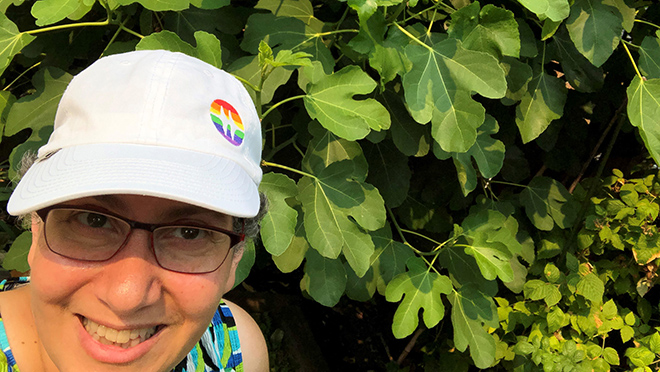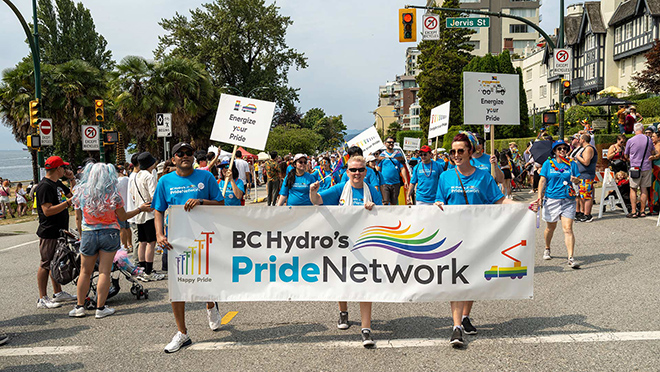Pride Month Q & A: '40% of us can't talk about our weekends'

A conversation with the outgoing co-chair of BC Hydro's Pride Network
Despite her smarts and creativity, and her popularity with co-workers, Deborah LeRose didn't always feel as comfortable and accepted at BC Hydro as she does today. And she's aware that others in the 2SLGBTQIA+ community inside and outside her workplace struggle for acceptance.
That's why the business improvement manager took on a co-chair position with our Pride Network four years ago and helped it grow in influence and in membership, with more than 320 current members.
Since 2017, our employee-led Pride Network, made up of members of the 2SLGBTQIA+ community and their allies, has worked toward providing a safe, inclusive space to connect, network, share experiences, and build relationships through events and education. With strong support from our leadership team, the network proactively advocates for a business environment where everyone can bring their authentic selves to work.
As LeRose prepares to leave her co-chair position with the Pride Network, former digital communications team colleague Rob Klovance sat down with her to talk about her own journey, the significance of Pride Month, and the work ahead.
Note that the following Q & A has been edited for brevity and clarity.
Rob Klovance: As a member of the 2SLGBTQIA+ community with a remarkable 32-year career (and counting) at BC Hydro, you bring a deep perspective around the evolution of rights and equality in the workplace. Let's start with a look at the Pride Network and where it's at today.
Deborah LeRose: This Pride Network role has been a lot of work but really energizing as well. It's been fun to see how much BC Hydro has moved, especially in terms of executive- and board-level support for not just the Pride Network, but also for our other employee networks such as our cultural exchange, women's, Indigenous, and accessibility networks. It just seems like a different place today.
RK: In what ways is it different?
DL: That was one of the questions I was asked when I met with the board of directors last summer, the first time they had ever had anyone from the employee networks present to them. I explained that it was hard starting at BC Hydro 32 years ago, at a time where I had to hide so much of who I was. It was a time when I could be fired or kicked out of housing because of who I am. My partner wasn't Canadian. I couldn't sponsor her for immigration, couldn't put her on my benefits plan. For me, it was like 'Just keep your head down, try to blend in'.
RK: And where are you, and others at BC Hydro, at today?
I'm fortunate, personally. I'm pretty settled in my life, in the middle class with a good job and all of these other privileges that have made my life pretty settled. But as part of the Pride Network, I've become increasingly aware of the struggle that people are having, and how many still aren't out at work. We're a member of an organization called Pride at Work Canada, and their research shows that over 40% of 2SLGBTQIA+ employees in Canada are not out at work. We also did a survey of our network members, and those numbers hold up here at BC Hydro as well.
RK: The decision on whether to come out with co-workers is a personal one, but I think you're suggesting that there are challenges to making that choice. Why are you concerned with those numbers?
DL: It means that 40% of us can't talk about our weekends, can't talk about what we did on vacation, and often don't talk about our families because all of this stuff exposes who we are. And there's a safety element. If people don't feel safe to be themselves, having to watch what they say and watching their back, it impacts their work life.
RK: I saw in one of the Pride Network newsletters a feature about the importance of checking on the risks of travel to certain countries in the world. Tell us more about that issue of safety.
DL: Last summer the Canadian government put out a travel advisory saying that some states in the U.S. have enacted laws and policies that may affect 2SLGBTQIA+ persons, and that it may not be safe to travel there. That's our neighbour! So it's scary, and it's having an impact on people here. We're seeing more people, particularly trans people, who are staying closeted because of legislative changes in the U.S. and increased violence.
RK: Are there still concerns about that backlash against 2SLGBTQIA+ rights here in Canada and in B.C.?
DL: There were protests against our community here in Canada last year, and we're seeing some of this sentiment locally.
RK: The so-called 'anti-woke' movement in North America hits on a number of issues around gender, sexuality, and race. What's your take on the criticism by some that identity politics creates deeper divisions rather than improving inclusion and diversity?
DL: I really disagree with that. There are people who have a ton of privilege who don't know what it's like, or who haven't been in the shoes of people in our community. Even if you're out, you're always struggling that, while your sexuality or gender is just one part of you, it's the part that doesn't have full equality, or full access to everything that other people take for granted. Any time you walk into a new room or a new place, you're always wondering if someone is going to discriminate against you in one way or another.
RK: The good news is that support for 2SLGBTQIA+ people from outside your community seems to be growing. On a personal level, I'm seeing support in my hockey team's dressing room.One teammate always uses rainbow tape on his hockey stick, and over beers recently, another teammate talked to us about the struggles of his trans son. That wouldn't have happened even five years ago. How can we become better allies of your community?
DL: At BC Hydro, our network is distributing rainbow stickers and other items that demonstrate visible support for our community. When an ally puts up a rainbow sticker, they're signalling that 'I'm a safe space, this is a safe space.' And when you see the mix of allies and members anywhere, being visible and having fun, it's powerful. Come out and march with us in the parades. I really encourage anyone who has never marched in a Pride parade before to do it, because it's an incredibly joyful experience.

We’re celebrating pride across the province
June is Pride month and with that comes a series of fun community events. Our Pride Network members will be participating in these upcoming events:
Nanaimo Pride Parade – June 9, 2024
Hudson's Hope Pride Farmer’s Market – July 2, 2024
Vancouver Pride Parade – August 4, 2024
Related:
